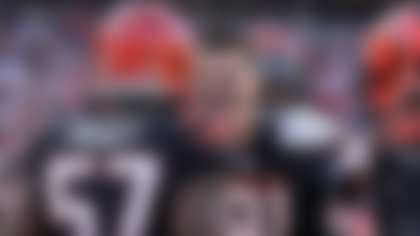After a celebratory ovation for their new starting quarterback, New York Jets fans quickly realized that the entire landscape of the 2023 season was about to change. Four snaps into his debut, four-time MVP Aaron Rodgers sat on the ground with what would later be diagnosed as a torn Achilles tendon, forcing backup Zach Wilson to be thrust back into the starting lineup.
Fans, coaches and players might tend to panic after losing a starting quarterback to serious injury. But the front office -- and general manager, in particular -- should be prepared for such a circumstance. Of course, you are emotionally impacted by the news and upset for the player, but you have an obligation to so many others who are trusting that you will do your job and put the team in the best position to succeed. There must be a plan already in place, because if you're scrambling to find a starting quarterback or new QB2 afterward, it's too late. You're behind the 8-ball.
I had the unfortunate experience of dealing with the early-season loss of a starting QB three times during my career as an NFL executive. There was a different outcome in each one of those seasons, but when looking back, the preparedness our personnel department and how we transitioned to the backups already on hand when our QB1s went down is what we were proud of.
Here's how each situation played out:
1) The first, ironically, occurred when I was with the Jets, in 1999, when I was serving as director of pro personnel. The season prior, we made the AFC Championship Game with Vinny Testaverde, who played lights out. So there was a lot of excitement heading into the '99 campaign -- and then, like Rodgers, Testaverde injured his Achilles in the season-opener, which, in this case, was a loss to the Patriots. Testaverde was replaced by Rick Mirer, whom we acquired in August , and Ray Lucas, a quarterback/special-teamer. Our department had done a lot of work scouting Mirer early in his career. At the time of the trade, he was the fourth quarterback in Green Bay's QB room, alongside Brett Favre, Matt Hasselbeck and Aaron Brooks. We knew we needed another backup option. In part because of the relationship between then-Jets head coach Bill Parcells and then-Packers GM Ron Wolf, we were able to get a deal done -- and avoid waiting for Mirer to clear waivers, had he been cut ahead the roster deadline -- with a move that benefited both teams. We finished the season 8-8.
2) The final two instances happened when I was with the New England Patriots. The first occurred during that famous 2001 campaign, when Tom Brady -- who, of course, was drafted in the sixth round in 2000 -- supplanted an injured Drew Bledsoe in Week 2 and took over the starting role in Week 3. Brady started out as a developmental player in 2000, and we made the conscious choice to keep him as our fourth QB on the 53-man roster that year -- the kind of move that was unheard of at the time -- because we saw something special in him and didn't want him to be available for other teams to sign. After taking an entire season to learn from Bledsoe and other veteran players, Brady helped that team win 11 games on the way to the franchise's first Super Bowl title, a victory over the St. Louis Rams.
3) Then, in Week 1 of 2008, fresh off a historic 18-1 season that ended in a Super Bowl defeat, Brady sustained a season-ending ACL injury and was replaced by Matt Cassel, a seventh-round draft pick in 2005 who'd logged a handful of appearances in the previous three seasons. A developmental player who ascended over time into the QB2 spot, Cassel rose to the occasion and was tremendous, finishing with the eighth-most passing yards (3,693) and tying for the 10th-most passing touchdowns (21) in the NFL that season. However, even after winning 11 games, we missed out on a playoff berth, losing tiebreakers with the Dolphins (who made it as AFC East champions) and Ravens (who snagged a wild-card spot).
Jets coach Robert Saleh has said Wilson for the remainder of the season (veteran Tim Boyle was elevated from the practice squad to be QB2). While some observers have speculated about the Jets trading for or signing a new QB1, I believe we should credit New York for having an apparent plan in place with Wilson, especially after a roller coaster 2022.
Wilson struggled on the field last season (187.6 passing yards per game with a 6:7 TD-to-INT ratio) and showed signs of . But he has been served multiple slices of humble pie over the past year, first getting benched in November, then watching the Jets trade for Rodgers in the offseason. It is likely that stepping out of the New York spotlight and while Rodgers prepared for 2023 was a good thing for Wilson. He was given the luxury of learning from a true pro and watching how Rodgers handles his business in the facility. And though Wilson isn't Rodgers, they have similar playing styles as pocket passers, which should help smooth the transition from a game-planning and play-calling standpoint.
Adding another backup would make sense (free agent Joe Flacco could be a legitimate option, because of his experience with the franchise; since Saleh became head coach in 2021, Flacco has played in seven games and gone 1-4 as a starter). But making major changes to personnel or your scheme during the regular season is detrimental to the team's success. So as exciting as it may be for fans to imagine other veteran quarterbacks who might be available to potentially start -- free agents Carson Wentz, Nick Foles, Cam Newton and Matt Ryan, or someone with another team who could be traded for -- in a Jets uniform, it's not the time of year to start anew at the game's most important position.
The job of the front office is to set the organization up for success from a personnel perspective. And while you hope your backup plan is never tested, you want to be as prepared as possible if you need it. The Jets are seemingly prepared with Wilson. Now all that's left is to see how the season plays out.












